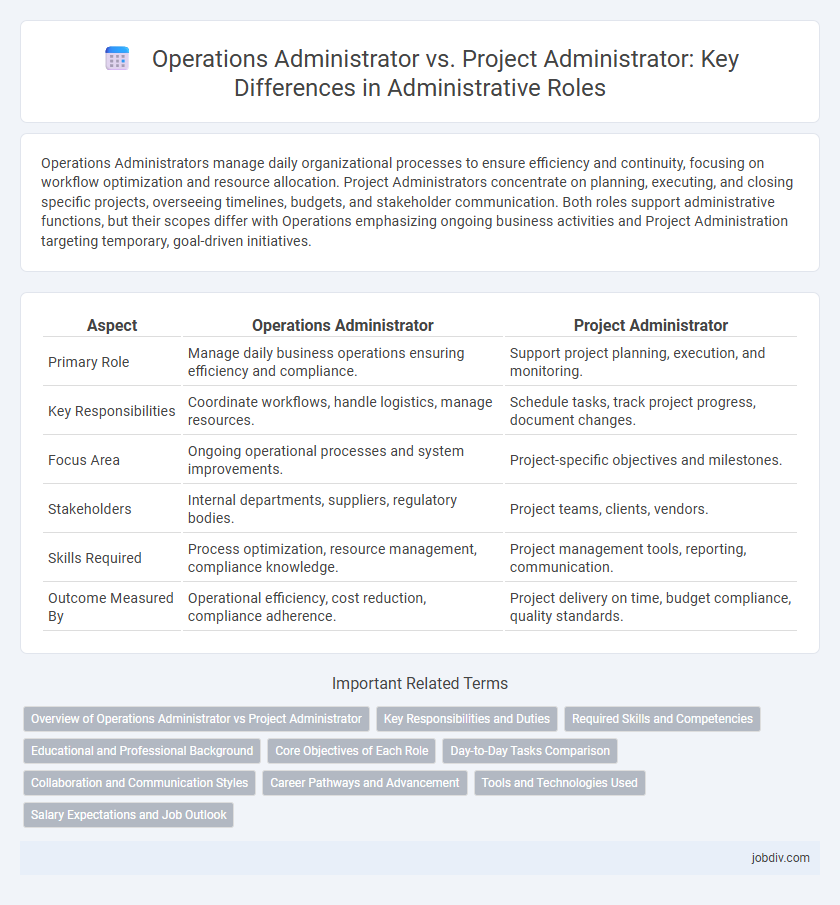Operations Administrators manage daily organizational processes to ensure efficiency and continuity, focusing on workflow optimization and resource allocation. Project Administrators concentrate on planning, executing, and closing specific projects, overseeing timelines, budgets, and stakeholder communication. Both roles support administrative functions, but their scopes differ with Operations emphasizing ongoing business activities and Project Administration targeting temporary, goal-driven initiatives.
Table of Comparison
| Aspect | Operations Administrator | Project Administrator |
|---|---|---|
| Primary Role | Manage daily business operations ensuring efficiency and compliance. | Support project planning, execution, and monitoring. |
| Key Responsibilities | Coordinate workflows, handle logistics, manage resources. | Schedule tasks, track project progress, document changes. |
| Focus Area | Ongoing operational processes and system improvements. | Project-specific objectives and milestones. |
| Stakeholders | Internal departments, suppliers, regulatory bodies. | Project teams, clients, vendors. |
| Skills Required | Process optimization, resource management, compliance knowledge. | Project management tools, reporting, communication. |
| Outcome Measured By | Operational efficiency, cost reduction, compliance adherence. | Project delivery on time, budget compliance, quality standards. |
Overview of Operations Administrator vs Project Administrator
Operations Administrators oversee daily business activities, managing workflows, resources, and process optimization to ensure organizational efficiency. Project Administrators coordinate project-specific tasks, timelines, and stakeholder communications to support project delivery and goal achievement. Both roles require strong organizational skills but differ in scope, with Operations focusing on ongoing processes and Project Administration targeting temporary, goal-oriented initiatives.
Key Responsibilities and Duties
Operations Administrators manage day-to-day business functions including process optimization, resource allocation, and compliance monitoring to ensure smooth organizational workflow. Project Administrators focus on supporting project planning, tracking timelines, coordinating team communication, and managing documentation to facilitate project delivery. Both roles require strong organizational skills, but Operations Administrators prioritize ongoing operational efficiency while Project Administrators concentrate on specific project objectives and milestones.
Required Skills and Competencies
Operations Administrators require strong analytical skills, process optimization expertise, and proficiency in resource allocation to ensure efficient day-to-day workflows. Project Administrators focus on project planning, risk management, and stakeholder communication, necessitating skills in scheduling tools and budget tracking. Both roles demand excellent organizational abilities, attention to detail, and proficiency in administrative software to support their respective operational or project-focused functions.
Educational and Professional Background
Operations Administrators typically hold degrees in business administration, management, or related fields with emphasis on logistics, process improvement, and organizational behavior. Project Administrators often possess educational backgrounds in project management, engineering, or specialized industry certifications such as PMP, emphasizing planning, scheduling, and resource allocation. Both roles benefit from professional experience in coordination and communication, but Project Administrators usually require formal training in project lifecycle and risk management methodologies.
Core Objectives of Each Role
Operations Administrators focus on streamlining daily business functions, ensuring efficient workflow management, resource allocation, and compliance with organizational policies to maintain operational stability. Project Administrators oversee project planning, coordination, and execution, managing timelines, budgets, and stakeholder communication to achieve specific project goals. Both roles require strong organizational skills, but Operations Administrators drive continuous process improvement while Project Administrators concentrate on project-specific deliverables and milestones.
Day-to-Day Tasks Comparison
Operations Administrators focus on streamlining daily business processes, managing logistics, and ensuring resource availability to support continuous workflow. Project Administrators coordinate project schedules, track milestones, and facilitate communication between stakeholders to meet specific project goals. While Operations Administrators handle routine organizational functions, Project Administrators specialize in managing tasks directly related to project lifecycle execution.
Collaboration and Communication Styles
Operations Administrators excel at fostering cross-departmental collaboration through structured communication channels, ensuring operational continuity and efficiency. Project Administrators prioritize dynamic, real-time communication tailored to project timelines and stakeholder needs, facilitating agile teamwork and timely task completion. Both roles require strong interpersonal skills, but Operations Administrators emphasize consistency, while Project Administrators emphasize adaptability in their collaboration approaches.
Career Pathways and Advancement
Operations Administrators typically advance by gaining expertise in workflow optimization and resource management, progressing into roles like Operations Manager or Director of Operations. Project Administrators often develop skills in project planning, risk assessment, and stakeholder communication, leading to positions such as Project Manager or Program Manager. Both pathways offer opportunities in leadership and specialized administration sectors, but the choice depends on individual strengths in operational efficiency versus project lifecycle coordination.
Tools and Technologies Used
Operations Administrators primarily utilize enterprise resource planning (ERP) systems like SAP and Oracle to streamline workflows and manage daily administrative tasks, alongside communication tools such as Microsoft Teams and Slack. Project Administrators focus on project management software including Microsoft Project, Asana, and Jira to track project progress, allocate resources, and generate status reports. Both roles often leverage Microsoft Office Suite for document creation and data analysis, ensuring efficient documentation and reporting.
Salary Expectations and Job Outlook
Operations Administrators typically earn between $50,000 and $70,000 annually, reflecting their role in managing daily business activities and ensuring operational efficiency. Project Administrators generally have salaries ranging from $55,000 to $75,000, with compensation influenced by the complexity and scale of projects managed. Employment growth for both positions is steady, with Project Administrators expected to see a slightly higher increase due to expanding project-based work environments across industries.
Operations Administrator vs Project Administrator Infographic

 jobdiv.com
jobdiv.com